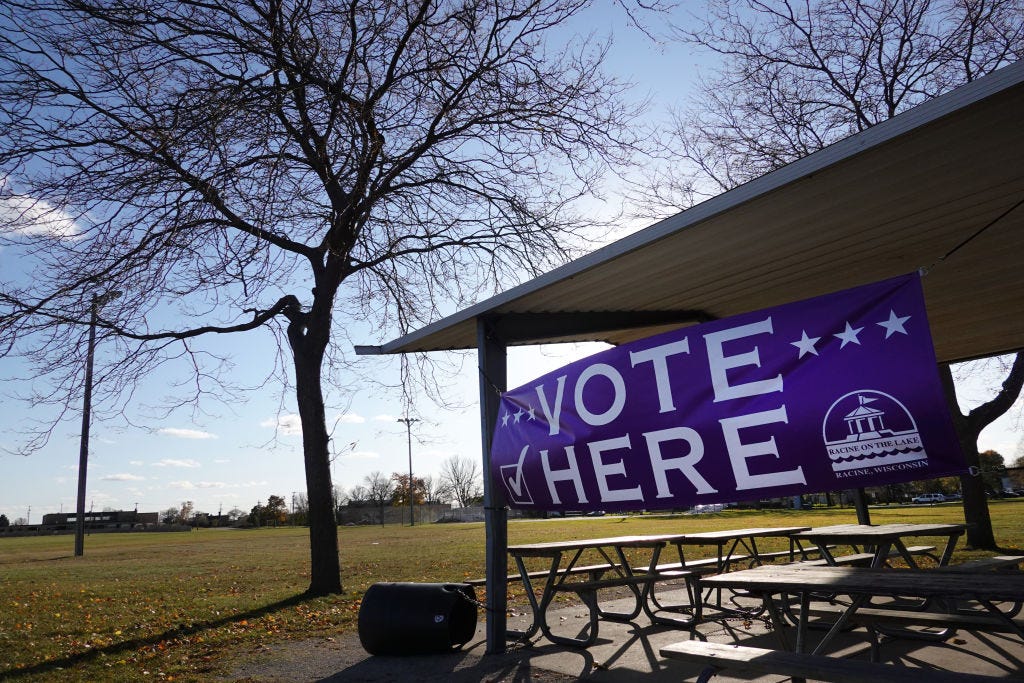A warning from Michigan
Jocelyn Benson, that state's secretary of state, on how disinformation has become the great threat to a free and fair election
Four years ago, protesters gathered outside the home of Michigan Secretary of State Jocelyn Benson, calling for her to reject the results of the 2020 election. Last month, she was the target of two “swatting” attacks, in which someone calls in a false report of a hostage situation or other crisis to provoke an armed police response. Benson has made it clear that these attacks on her as the overseer of state elections are attacks on the freedom of millions of Michigan voters.
Despite right-wing claims to the contrary, the mechanisms of American elections are remarkably robust, even under the unprecedented pressure they’ve been subjected to over the last decade. Unfortunately, claims of fraud, stoked by bad-faith actors, are believed by a significant portion of Americans. It is one aspect of the very serious threat to democracy posed by the MAGA movement.
The electoral stakes are even higher this year, and voters and officials face new threats from coordinated disinformation campaigns and A.I. deepfakes further poisoning an information environment that’s more fragmented than ever by the division between weakened news organizations and the ever more important ecosystem of social media, influencers, and content creators. So we reached out to Benson to talk about how she and her colleagues across the country are preparing for the existing and novel threats they expect to face over the next two months.
She told us about how much the continuing attacks on the system have changed the job of administering elections over the past few cycles, what sort of support state election officials need from the federal government, her take on how effective the Harris campaign has been in communicating to swing-state constituents, and what voters need to know to do their part in preserving the democratic process. Most surprisingly to us, she suggested that the locus of electoral sabotage has evolved in recent years, and that the rest of us need to catch up to where the problem is.
A request for those who haven’t yet joined us: The interviews and essays that we share here take research and editing and much more. We work hard, and we are eager to bring on more writers, more voices. But we need your help to keep this going. Join us today to support the kind of independent media you want to exist.
You've obviously been on the front lines of this question of election integrity in Michigan, and around the country, and people have not just argued with you about it, but come after you personally for it for some time now. I understand that last month, their rage literally landed on your doorstep. Can you tell me what happened last month and what it tells you about where your state and the country are right now?
Yeah. I think the path to the presidency runs through our state, runs through Michigan, and because of that, we are very much in the eye of the storm. And recognizing that reality, the attacks, the misinformation, the vitriol, the threats, it really escalated in the last several months. Among other things, it meant twice within a 48-hour period, my home was swatted in the middle of the night, once in the middle of Saturday, and then again early on a Monday morning.
What did that actually mean, practically, for you? What happens?
Well, it means in the dark of night, when police get a call that something particularly violent is occurring in the home, that police show up without their lights, walk up to the home, and intend to potentially forcefully enter it if no one answers or just various different procedures. And it just creates a potentially volatile and even violent, maybe even deadly, situation for a family who is simply just inside resting. And we know that a number of candidates have been impacted by this in our state, a number of election officials as well, have been impacted by this across the country. So it's unnerving in its volatility and in the uncertainty it creates.
But I was grateful that my husband, who was in the military, knew what to do. He called the local police as soon as he saw, through our security cameras, people approaching our home, and we live just half a mile away from the local police station. So they were able to affirm that there was a call that was made and they were showing up in response to that call. And then they radioed the police outside our home, from their local station, to say everything was fine inside. And then the police stood down, and my husband went outside and talked to them.





